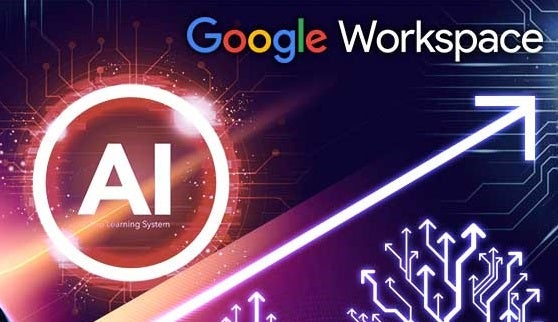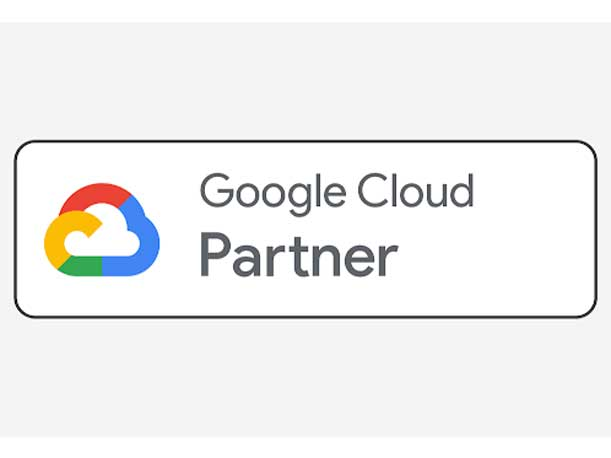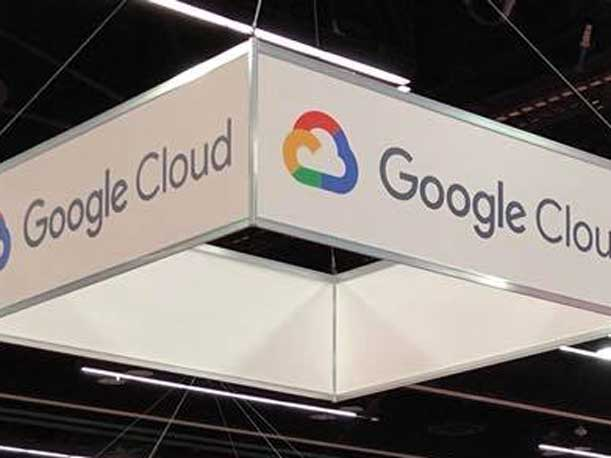Google Exec On 60 Percent Workspace Partner Margins, Besting Microsoft
“I don’t think you could point to another large technology company that’s ever done something like this: 60 percent margin. And that’s not ‘up to’ 60 percent, but actually 60 percent,” Google’s Kevin Ichhpurani tells CRN.

Google Cloud is taking channel margins to new heights as Kevin Ichhpurani tells CRN that Google partners who win new Workspace business will now receive 60 percent margin for the first year.
“Google has just rolled out the most lucrative incentive for new business than any technology company I’ve seen in my career,” Ichhpurani, corporate vice president of global ecosystem and channels at Google Cloud, told CRN.
[Related: 10 New Google Gemini AI Launches For GCP, Security And Cloud]
“For year one, we are giving 60 percent margin to partners for new Workspace business—that’s more than Google makes. So the majority of it is going to the partner,” said Google Cloud’s global partner leader. “I don’t think you could point to another large technology company that’s ever done something like this: 60 percent margin. And that’s not ‘up to’ 60 percent, but actually 60 percent.”
Gemini Injected Into Google Workspace
The $37 billion Mountain View, Calif.-based AI and cloud company is doubling down on channel incentive dollars and partner funding to drive net-new Google Workspace customer wins.
Gemini is Google’s generative AI portfolio that includes AI models, agents, code assistants, chatbots and more of the company’s most cutting-edge AI technology. This month at Google Cloud Next, the company injected new Gemini capabilities into popular products like BigQuery and Workspace, as well as the launch of its new AI-powered video creation app: Google Vids.
“This is a killer application. And it’s a once-in-a-lifetime opportunity for the collaboration tools to take off at a different level of trajectory,” Ichhpurani said. “The opportunity is now. And we wanted to put forward the most lucrative program in the entire tech industry.”
In an interview with CRN, Ichhpurani talks about the new 60 percent Workspace margins for partners and Google’s AI channel differentiation compared with Microsoft. He also addresses Google’s decision to lower Workspace renewal margins in favor of boosting new Workspace business margins.

Some partners are upset about Google reducing Workspace renewal margins. Talk about making that cut and what Workspace partners should be focused on right now.
I don’t personally agree with the headline that it’s a renewal cut. I think what’s really missing from the story is Google has just rolled out the most lucrative incentive for new business than any technology company I’ve seen in my career.
For year one, we are giving 60 percent margin to partners for new Workspace business—that’s more than Google makes, the majority of it’s going to the partner. I don’t think you could point to another large technology company that’s ever done something like this: 60 percent margin.
And that’s not ‘up to’ 60 percent, but actually 60 percent.
For example, let’s say for year one, you get a 20 percent margin plus a 40 percent rebate for driving new business. So 60 percent on new Workspace business.
You know what the margins are like in the industry, that’s the most lucrative. If you were to compare this to Microsoft, significantly more margin for year one. That’s behavior we want to drive around much more significant new business.
Also keep in mind, most of the contracts for Workspace are three-year deals. So it’s only when the renewal comes up. … Workspace with Gemini is a killer application.

Why is Google giving 60 percent margins to partners on new Workspace wins?
Why did we do this? Because we’ve never seen an opportunity, when you look at Gemini enriched in Workspace, like this.
If I’m a salesperson, I can now send 100,000 emails every day and you’d never know they were computer generated. I could send you an email saying, ‘You bought these black jeans yesterday. I have a matching sweater. Come in by 5 o’clock tomorrow, there’s a 20 percent discount. I’ll be at the desk.’ That’s the power when you bring email, customer information and generative AI together, you could tailor an email to every single person. These are the kinds of things that are possible with Gemini.
For example, in a natural language query, I can show all the trend analysis on how my company is doing from a top-line and profitability perspective and why. I can then create a presentation. I can send a virtual agent in my place when I don’t want to attend the meeting. I don’t think there’s a customer that can say no to that. I can analyze spreadsheets and natural language. I can summarize all my emails. I can understand the most important emails.
This is a killer application. And it’s a once-in-a-lifetime opportunity for the collaboration tools to take off at a different level of trajectory. The opportunity is now. And we wanted to put forward the most lucrative program in the entire tech industry.
We really think this is the opportunity. We want to capture it now and want to offer the most lucrative incentives to do so.

What is Google’s channel differentiation compared with the Microsoft and AWS strategy?
We fundamentally hear from partners every day that they feel like we are where the puck is going.
If you look at where a lot of other hyperscalers have been focused on: compute, storage and network, there’s plenty of that that still exists, but it’s really now morphed into industry and business process and how do I rethink the way a business process works?
For example, we optimized the supply chain and improved sustainability for Walmart at a store level using our technology. Companies like Hyundai—they’ve had a 40 percent improvement of digital engagement in nine weeks. And now we’re talking about how do we bring generative AI into the vehicle to improve the driver experience.
We’re talking about true business process transformation and creating completely new offerings for clients. This is a lot more interesting than lifting and shifting VMs. This is about changing the fundamental company and the customers’ comparative advantage in the market.
So for Google partners, this has much larger TAM [total addressable market] and higher-value services than just lifting and shifting workloads. That’s where the partners are seeing the Google difference right now. That we bring industry, we bring data, the data foundation and the AI to help with core transformation at an industry level.
Anything else?
Also, our security in Workspace is one of biggest reasons why customers are moving off Microsoft to Workspace. It’s our security.
There are many U.S. government institutions [buying Google Cloud]. … So we have the most security-sensitive companies on the planet that have gone to Google Cloud. So security is a huge differentiator for us.

Google is increasing generative AI incentives by 10X this year. What do partners need to do to get those 10X incentive increases? Where are the opportunities for partners?
Fundamentally, we want our partners to ideate with the customers to identify what are the top use cases that are going have the biggest impact on their business? Our customers are saying, ‘Can you help me prioritize those use cases?’
We want partners to talk about: ‘What are the top use cases? What is the lowest risk? How can I balance that? Then what can I reasonably implement because some things might require a lot of integrations to other applications to make them a reality?’
So really looking at the biggest [AI] impact with the lowest risk. And ‘What can I do short term versus what’s going to take me 18 months?’ They’re looking at those three dimensions. So they need a lot of help from partners on that.
Then they’re asking for our partners to help them get their data state in order, which is a huge body of work. Then there is, ‘How do I choose the right AI model?’ Because Google Vertex alone has over 130 different models between all models from Google, partner models, open-source models, closed-source models, and we have our Model Garden.
Partners really understand price-performance. So maybe one model might have higher efficacy than another, but the cost is higher and the lower the latency is longer.
Then there’s a whole body of work around, ‘How do I ground the model by bringing in my proprietary corpus of data and grounding the model for higher efficacy?’ Then there is all the work that needs to be done around cybersecurity and responsible AI and governance.
Then we see a lot of opportunity around, ‘When I create a new business process, how do I actually need to implement that internally in the company?’ So [it’s about] business process re-engineering and talent transformation.

Talk about Google injecting new Gemini AI innovation into products like Workspace, Looker and BigQuery. What benefits will businesses see?
You can imagine Workspace and BigQuery working together in tandem. For example, I am a CEO and I have to do a presentation to my board. I want to show trend analysis.
The data is all sitting in BigQuery and Workspace. I want to be able to create some slides in Workspace that show the trend analysis of what’s happening with my revenue and profitability. But not just a graph and all of the BigQuery data—but why? What’s the reason for my revenue and profitability? Maybe it’s because inventory levels are low, or maybe the Asia-Pacific sales are down. But understanding all the root causes—[Gemini] will actually go into BigQuery, understand all the root causes, and then produce a slide deck that you could present to the board on the trends and why?
All through a natural language conversational approach. That’s amazing. It’s pretty incredible what we’ve done for clients.
From a security perspective, your biggest challenge is—let’s say you’re looking at security logs. We’ve gone to some customers and they have several thousand alerts. How do you know what to do?
Gemini is able to determine what the biggest threats and most important environment vulnerabilities are. What are the most important ones that you need to go focus on first? Which ones are more likely to cause an issue? So you understand not only what are the most critical vulnerabilities, but what’s the path that a bad actor is going to take to penetrate. And how do I close that door?
That’s what the power [of Gemini] is in security. When you have so many signals you don’t know what to do, when you combine it with the AI, you’re actually able to take action in a meaningful way.

What’s one big thing you want partners to know right now in terms of sales?
What’s really changed is the buyer is much more turning to line-of-business buyers, not the IT department.
More and more of these decisions are being made by line-of-business or the product teams. So that’s a big shift that partners are going to need to evolve to be able to sell to line of business.
Partners are working with pharma companies on how they get drugs to market faster. Imagine the impact of that to a pharmaceutical company getting drugs to market faster—that’s billions of dollars.
That’s much more interesting than moving an Outlook and Exchange workload.
Helping a pharmaceutical company accelerate drug discovery or optimize the way they do clinical trials, helping a bank reduce fraud prevention, helping a retailer better dynamically target customers more effectively—we’re helping the business.
Most of these opportunities are with lines of business. It’s being more driven by line-of-business than IT because we’re helping customers with their core products.
Now you can see why a partner would be super interested in this much higher-value service. If you’re helping a customer grow hundreds of millions or even billions on the top line or savings—that is a much higher-value opportunity than just lifting and shifting workloads to hyperscaler technology.
That’s what the partners are latching on to because when you’re impacting the business, you’ve got a much more viable business.

What’s your plan to drive sales and customer stickiness for Google Cloud partners around AI in 2024?
What’s beautiful about this moment is—we called it the AI MSP—this isn’t a one-and-done thing.
The customers are saying, ‘I want to leverage the new capabilities of the model.’ And new models can come out in as fast as 90 days. So it’s like, ‘OK, this new thing just came out. Here’s how you leverage it.’
Customers are saying, ‘I don’t have the bandwidth to do this. I want to focus on innovation in the business process and the new business offerings. I want my partner to do all of this AI for me.’
For partner [sales and customer mindshare], this is a continual thing. It’s like the gift that keeps on giving for partners.
Then there’s incentives that we provide along the way. So whether a partner is sourcing business, doing the proofs of concept or the assessments—we have incentives and funding for that. We have dedicated partner support funding resources. If partners can continue to accelerate consumption, we have funding there as well.
Generative AI and artificial intelligence in general is a massive opportunity for Google partners.